|
|
Ed Ruscha, Colored People, 1972
|
|
Ed Ruscha, Colored People, Los Angeles, 1972 [5]
|
| |
|
Ed Ruscha, geboren in 1937 in Omaha, Nebraska, is een invloedrijke kunstenaar die wordt beschouwd als een pionier van het kunstenaarsboek. Zijn unieke benadering van het boek als kunstvorm heeft een blijvende stempel gedrukt op de wereld van de hedendaagse kunst.
In 1972 publiceerde Ed Ruscha zijn zestiende kunstenaarsboek in een oplage van 4.065 exemplaren. De afbeeldingen in het boek, kleurenfoto's van cactussen en enkele palmbomen, waren typerend voor Ruscha's eerdere fotoboeken. Het is een strak georganiseerde typologie van beelden, die losgemaakt zijn van hun achtergrond en op een witte achtergrond gepresenteerd als een schilderachtige verzameling.
Ed Ruscha, Colored People, 1972
Kaft bedrukt op de voor- en rug, 15 fotografische illustraties van cactussen en palmbomen, 46 blanco pagina's, titelpagina en copyrightpagina. Gedrukt op 100 gr. Flocote Enamel papier door G.R. Hutter Lithography, Burbank, California. Uitgegeven door de kunstenaar in een enmalige oplage van 4.065 exemplaren.
|
 |
Ed Ruscha, Colored People (double page), Los Angeles, 1972 [1]
|
|
| |
|
In deze eerste en enige uitgave gaat Ruscha indirect in op het discours rond de term "gekleurde mensen" door paradoxaal genoeg nergens letterlijke personen af te beelden. In plaats daarvan bestaat de eerste helft van het boek uit vijftien offset kleurenfoto's van cactussen, vetplanten, palmen, bananenbomen en andere woestijnvegetatie, ontdaan van context en opgehangen tegen smetteloos wit. De rest van het gelijmde boek is volledig blanco en bevat zelfs deze vervreemde exemplaren niet. Er valt veel te lezen in deze stekelige publicatie in termen van (on)zichtbaarheid, metafoor, vervreemding, representatie, afwezigheid, enzovoort [2].
|
|
Ed Ruscha, Colored People (artists's book with 15 photographic illustrations
of cacti and palm trees), Los Angeles, 1972 [1]
|
|
| |
|
Ruscha publiceerde in de jaren '60 en '70 een reeks kunstenaarsboeken die in een grote oplage geproduceerd waren en relatief goedkoop aangeboden werden. Deze 16 kleine kunstenaarsboeken blijven definitieve klassiekers van het genre [4].
Ruscha's kunstenaarsboeken zijn vaak minimalistisch van aard, en worden gekenmerkt door heldere en eenvoudige ontwerpen en het gebruik van alledaagse taal.
Zijn boeken behandelen uiteenlopende onderwerpen, van benzinestations en zwembaden tot parkeerterreinen, palmbomen, woestijnlandschappen, vlekken enzovoort. Zijn meest iconische werk uit die periode is Twentysix Gasoline Stations (1963). Het is een bescheiden publicatie bestaande uit een reeks zwart-wit foto's van benzinestations langs de snelweg tussen Ed Ruscha's huis in Los Angeles en zijn ouderlijk huis in Oklahoma City. Riva Castleman, auteur van A Century of Artists' Books waarin ook Twentysix Gasoline Stations was opgenomen, noemde Ruscha's publicaties bookworks. [2]
In deze eerste en enige uitgave gaat Ruscha indirect in op het discours rond de term "gekleurde mensen" door paradoxaal genoeg nergens letterlijke personen af te beelden. In plaats daarvan bestaat de eerste helft van het boek uit vijftien kleurenfoto's van cactussen, vetplanten, palmen, bananenbomen en andere woestijnvegetatie, ontdaan van context en opgehangen tegen smetteloos witte achtergrond. De rest van het boek, 46 pagina's, lat hij volledig blanco. [3]
|
 |
Ed Ruscha, Colored People (overview), 1972 [6]
|
| |
|
Er valt veel te lezen in deze stekelige publicatie in termen van (on)zichtbaarheid, metafoor, vervreemding, representatie, afwezigheid, enzovoort.[3]
Ed Ruscha:
«I did say people were distracting but this is the first time that I’ve used the word “people” in anything. The objects in the book were affectionately called people—people “in color.” The title was a primary motivation in the creation of the book. I have blind faith in the title and blind faith in the pictures, and the two seemed to come together so compatibly in this instance. The plants may appear to be more Mexican than Negro but they are colored people, yes? »[3]
Naast Colored People, bestaat de reeks kleine kunstenaarsboeken uit Twentysix Gasoline Stations, 1963; Various Small Fires, 1964; Some Los Angeles Apartments, 1965; Every Building on the Sunset Strip, 1966; Thirtyfour Parking Lots, 1967; Royal Road Test, 1967; Business Cards, 1968; Nine Swimming Pools and a Broken Glass, 1968; Stains, 1969; Crackers, 1969; Real Estate Opportunities, 1970; Babycakes, 1970; A Few Palm Trees, 1971; Records, 1971, Dutch Details, 1971 en Hard Light, 1978.
Voor het grootste deel zijn het eenvoudige boekjes die precies laten zien wat de titels aangeven. Thirtyfour Parking Lots is een reeks luchtfoto's van parkeerplaatsen; Nine Swimming Pools and a Broken Glass - het enige kunstenaarsboek met kleurenfoto's - bevat foto's van negen zwembaden en een gebroken glas. Enkele zijn wat groter van formaat of hebben zoals Sunset Strip de vorm van een leporello. Alles bij elkaar vormen ze een indrukwekkende, cryptische en soms ludieke verzameling fotografische werken van een kunstenaar die zichzelf niet eens als fotograaf beschouwt.
|
![Edward Ruscha, Artists' books in Herbert Foundation, Ghent [Exhibition view The Collection Herbert,
Herbert Foundation, October 01, 2023 - June 16, 2024]](https://lh3.googleusercontent.com/pw/ADCreHcfik6emRzC7MpPmT7HRgvhKWMokx3yCuGFCt8gEEbRWnKRHuzG32O-p0b-JDksUWgePaBAJshNbSdMV2Ip3YxSJeA8tnGFESKaFEBo4rKR3JGNV6mu=w4032-h3024-p-k) |
Edward Ruscha, Artists' books in Herbert Foundation, Ghent, November 2023 [Exhibition view The Collection Herbert,
Herbert Foundation, October 01, 2023 – June 16, 2024] [5]
|
|
|
Ed Ruscha, artists' books of bookworks
Twentysix Gasoline Stations, 1963
Various Small Fires, 1964
Some Los Angeles Apartments, 1965
Every Building on the Sunset Strip, 1966
Thirtyfour Parking Lots, 1967
Royal Road Test, 1967 (met Mason Williams en Patrick Blackwell)
Business Cards, 1968 (met Billy Al Bengston)
Nine Swimming Pools and a Broken Glass, 1968
Stains (1969)
Crackers, 1969 (met Mason Williams)
Real Estate Opportunities, 1970
Babycakes with Weights, 1970
A Few Palm Trees, 1971
Records, 1971
Dutch Details, 1971
Colored People, 1972
Hard Light, 1978 (met Lawrence Weiner) [4]
|

|
|
 |
|
 |
Ed Ruscha, Twentysix Gasoline Stations, 1963
|
|
Ed Ruscha, Some Los Angeles Apartmens, 1965
|
|
d Ruscha, Real Estate Opportunities, 1970
|
 |
|

|
|
 |
Ed Ruscha, Nine Swimming Pools and a Broken Glass, 1968/1976, second edition of 2000 copies
|
|
Ed Ruscha, Various Small Fires, 1970, Vermillion Editions Limited |
|
Edward Ruscha, Crackers, Heavy Industries, Hollywood, 1969
|

|
|
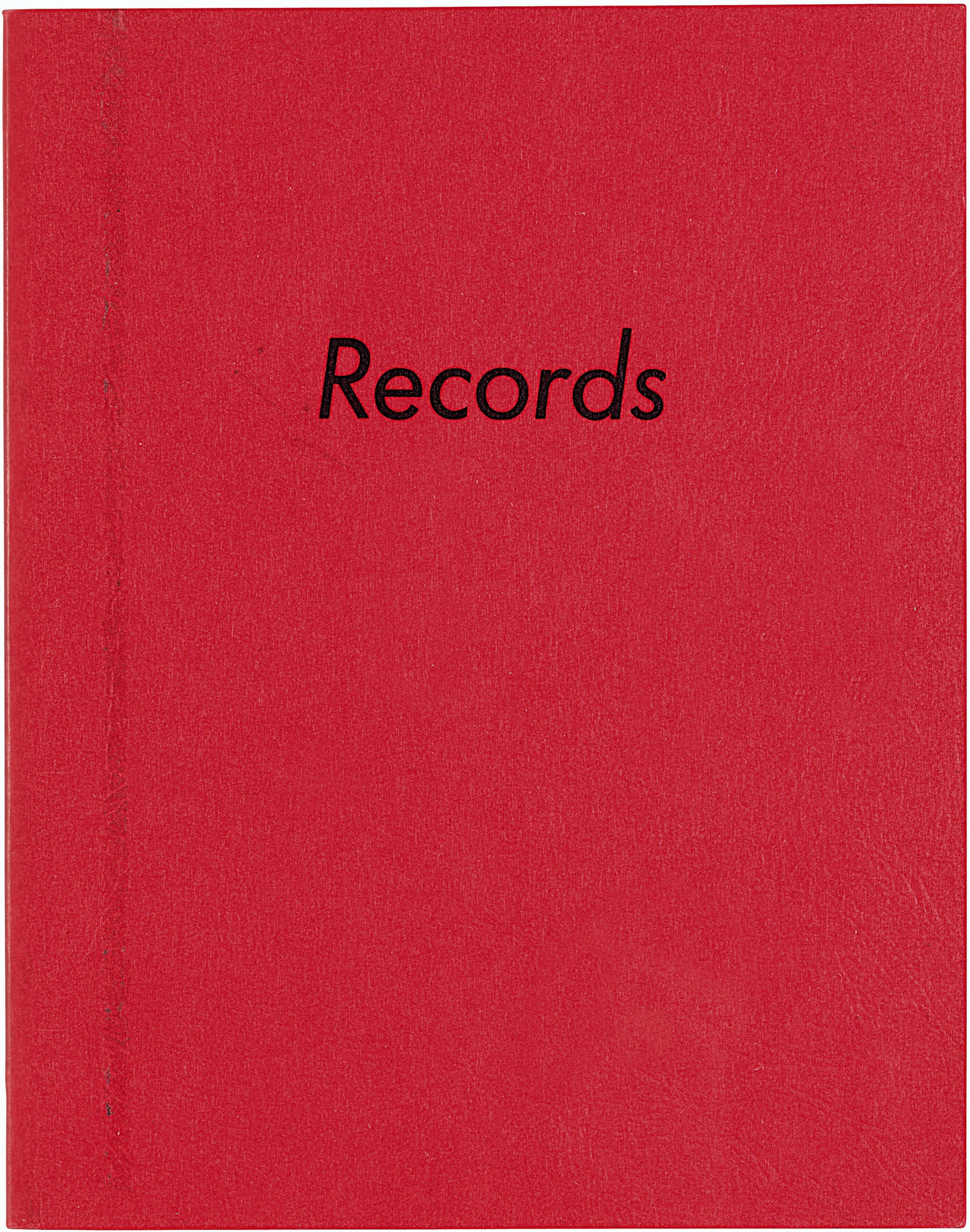 |
|
 |
Hard Light, Edward Ruscha, Lawrence Weiner, 1978
|
|
Ed Ruscha, Records, Heavy Industry Publications, Hollywood, 1971
|
|
Thirtyfour Parking Lots, 1967
|
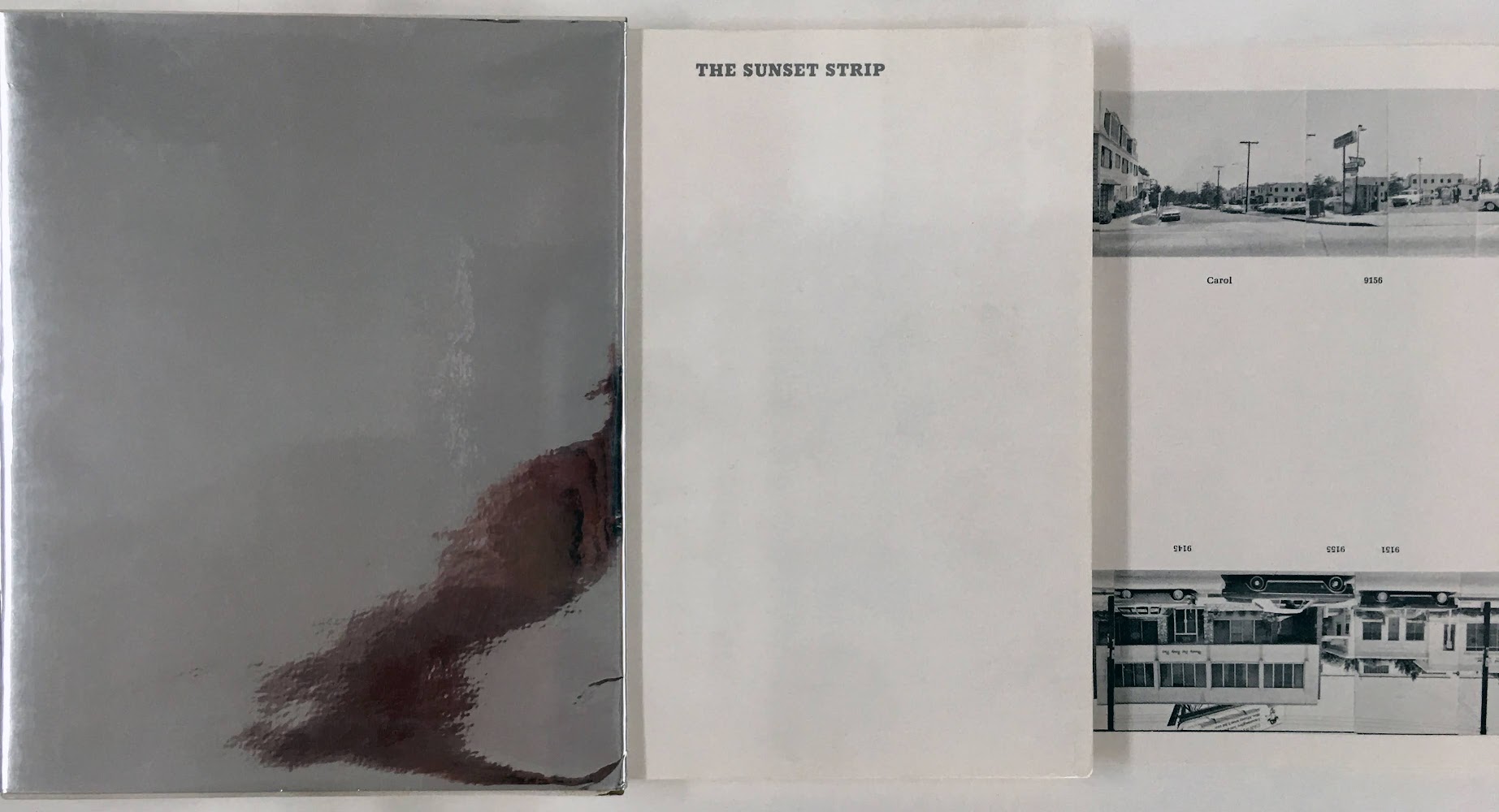 |
|
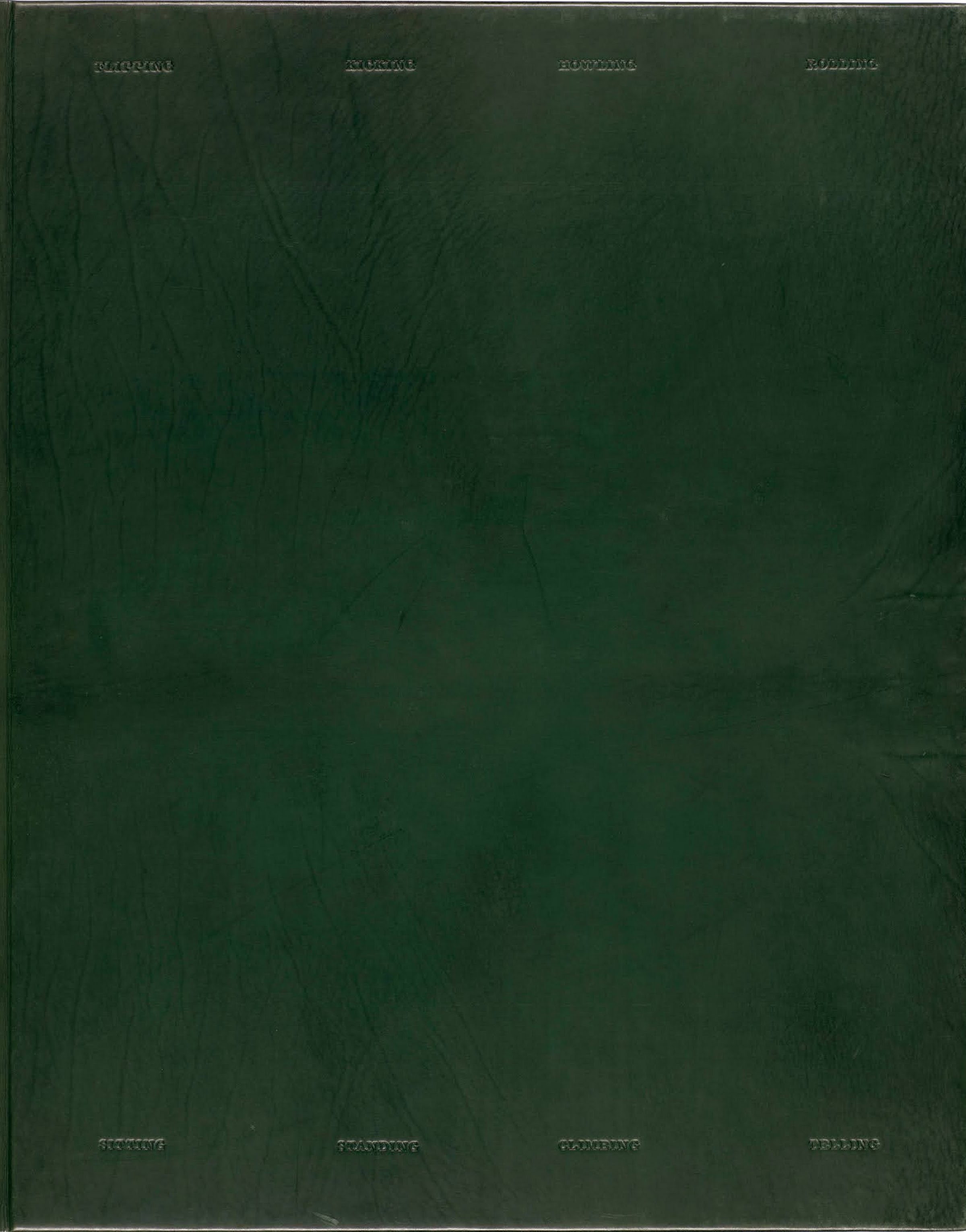 |
|

|
Edward Ruscha, Every Building on the Sunset Strip, 1966 [Collection Foundation Herbert, Ghent]
|
|
Edward Ruscha, Flipping, Kicking, Howling, Rolling, Sitting, Standing, Climbing, Telling, full green blind stamped linen slipcase, The Lapis Press, Los Angeles, 1988
|
|
Ed Ruscha, Stains, Heavy Industry Publications, Hollywood, 1969
|

|
|
|
| |
Ed Ruscha, een kleine bibliografie
|
|
|
Ed Ruscha: Reading Ed Ruscha, Kunsthaus Bregenz, 2013.
Edited by Yilmaz Dziewior. Text by Beatrice von Bismarck, Douglas Coupland, Yilmaz Dziewior, W. S. Di Piero.
Gepubliceerd ter gelegenheid van een tentoonstelling in het Kunsthaus Bregenz in Oostenrijk. De teksten die speciaal voor Reading Ed Ruscha zijn geschreven door Douglas Coupland en W.S. Di Piero onderzoeken Ruscha's gebruik van tekst door de lens van de literaire en poëtische vorm, terwijl Beatrice von Bismarck in haar essay het boek onderzoekt als werk, medium van publicatie en tentoonstellingsformaat.
Edward Ruscha: Editions 1962-1999, Walker Art Center, 1999.
Edited by Siri Engberg. Text by Clive Philpot.
Deze twee-delige publicatie presenteert een uitgebreide blik op de drukprojecten, edities en kunstenaarsboeken van Edward Ruscha.... Dit monumentale boek onthult de diepgang van Ruscha's afdrukproces en biedt een belangrijk inzicht in de unieke esthetiek.
Alexandra Karg, Ed Ruscha’s Innovative Approach To Artist’s Books | www.thecollector.com
Alexandra Schwartz, ed. Leave Any Information at the Signal: Writings, Interviews, Bits, Pages by Ed Ruscha. Cambridge: MIT Press, 2002.
Alexandra Schwartz , Ed Ruscha's Los Angeles, The MIT Press, 2010
Kelli Wood, That Was Then This Is Now: Alexandra Schwartz on Ed Ruscha, The New Art Examiner, 2022 | www.academia.edu
|

|
|
 |
|
 |
| Ed Ruscha: Books and Paintings, Richter Verlag, 2015 |
|
Clive Phillpot, Cornelia Lauf, Artist/Author. Contemporary Artists' Books, Distributed Art Publishers, New York, 1998
|
|
Alexandra Schwartz , Ed Ruscha's Los Angeles, The MIT Press, 2010
|
 |
|

|
|

|
Alexandra Schwartz, Leave Any Information at the Signal: Writings, Interviews, Bits, Pages by Ed Ruscha, The MIT Press, Cambridge, Massachusetts, London, England, 2002
|
|
Clive Phillpot, Siri Engberg, Edward Ruscha: Editions 1959-1999, Walker Art Center, 1999
|
|
Edward Ruscha. A Book Accompanying the Exhibition of Prints, Drawings, and Books of Edward Ruscha at the Minneapolis Institute of Arts (with Business Cards), 1971
|
 
|
|
 |
|
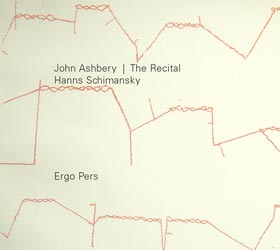 |
|
 |
Edward Ruscha, Every Building on the Sunset Strip, 1966 [Collection Foundation Herbert, Ghent]
|
|
John Ashbery, The Recital, Ergo Pers 2009, with etchings by Hanns Schimansky)
|
|
Hanns Schimansky, etching for La Récitation de l'oubli, 2009
|
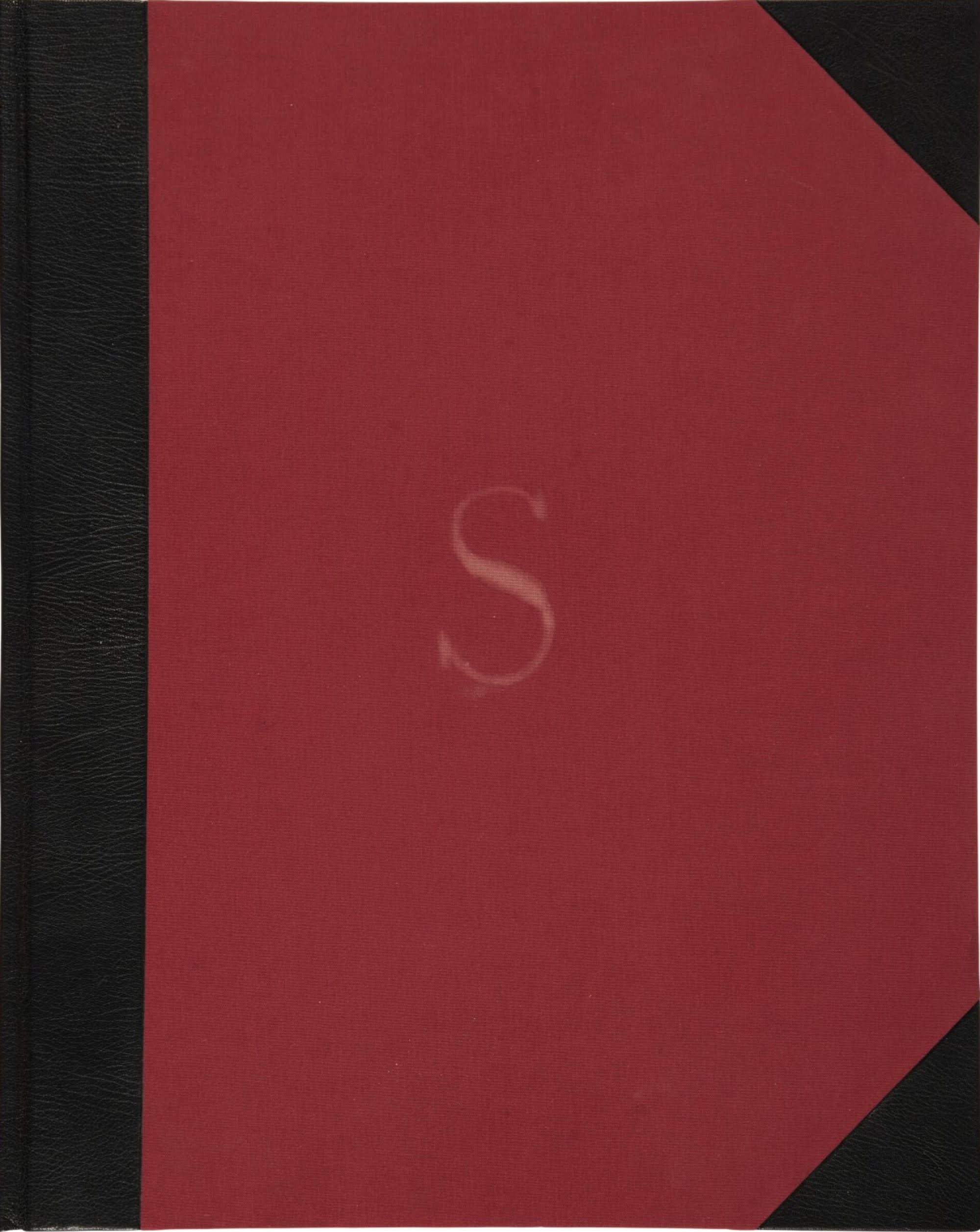
|
|
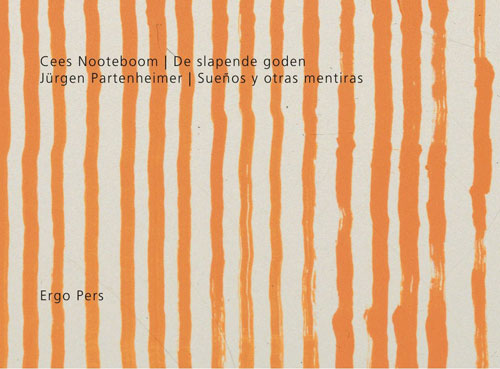
|
|
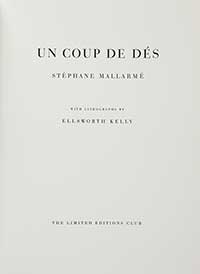 |
Ed Ruscha, Sayings from Mark Twain's Pudd'nhead Wilson, San Francisco, Greve/Hine & Limestone Press, 1995
|
|
Jürgen Partenheimer, Cees Nooteboom,
De slapende goden | Sueños y otras mentiras, Ergo Pers, Ghent, 2005 |
|
Ellsworth Kelly, Un Coup de dés jamais n'abolira le hasard, The Limited Editions Club, New York, 1992.
|
 |
|
|
[1] Images © Ed Ruscha through Art Gallery of NSW | Colored people, 1972 by Edward Ruscha | www.artgallery.nsw.gov.au
[2] Printed MATTER | Ed Ruscha, Colored People, 1972 | www.printedmatter.org
[3] Howardena Pindell, Words with Ruscha, in Alexandra Schwartz, ed. Leave Any Information at the Signal: Writings, Interviews, Bits, Pages by Ed Ruscha. Cambridge: MIT Press, 2002, p. 61.
[4] Stains (1969), waarin Ruscha 75 bladen met vlekken samenbracht, wordt doorgaans niet opgenomen in deze reeks. Het boek wordt door tendentieuze kunsthistorici nog beschouwd als een serie losse drukken, maar de catalogue raisonné van Ed Ruscha beschrijft deze portfolio van mixed-media vlekken op papier als een boek.
Naast deze reeks iconische kunstenaarsboeken publiceerde Ruscha ook later nog enkele belangrijke boeken.
Country Cityscapes, 2001
ME and THE, 2002
Ed Ruscha and Photography, 2004 (with Sylvia Wolf)
OH / NO, 2008
Dirty Baby, 2010 (with Nels Cline and David Breskin)
Flipping, Kicking, Howling, Rolling, Sitting, Standing, Climbing, Telling, Lapis Press, The Lapis Press, Los Angeles, 1988
Sayings from Mark Twain's Pudd'nhead Wilson, Limestone Press (printer), Greve / Hine, 1995
On the Road, (2009), Steidl with Gagosian Gallery, London, New York
[5] Foto Rein Ergo tijdens The Collection Herbert, Herbert Foundation, October 01, 2023 – June 16, 2024
t |
| |
|
|
|
| |
|
